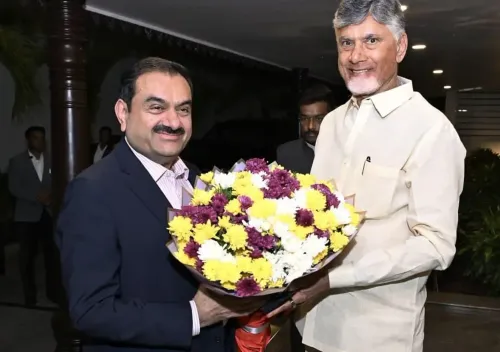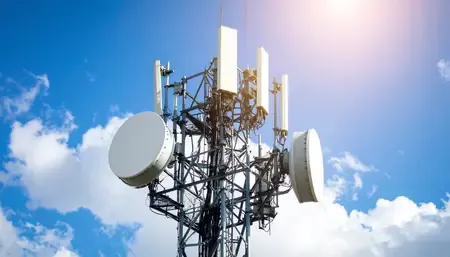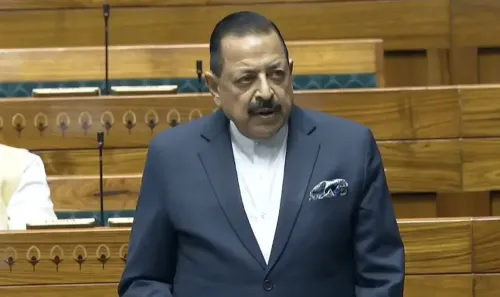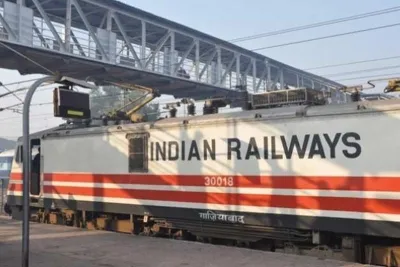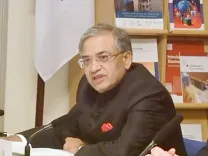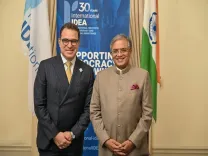How does PM Modi's India-UK Free Trade Agreement impact trade?
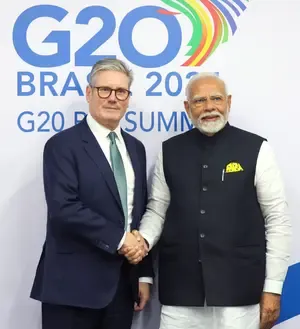
Synopsis
Key Takeaways
- 99% of Indian exports to the UK will benefit from zero duty.
- Significant opportunities in labor-intensive sectors.
- Exemption for Indian workers in the UK from social security contributions.
- Enhanced trade in services including IT and financial services.
- Stronger strategic alignment between India and the UK.
New Delhi, May 6 (NationPress) Prime Minister Narendra Modi and UK Prime Minister Sir Keir Starmer announced a groundbreaking India-UK Free Trade Agreement (FTA) on Tuesday, marking a significant milestone in bilateral relations.
This agreement was finalized following a phone conversation between the two leaders. Additionally, a Double Contribution Convention was signed to protect the rights of Indian workers in the UK.
"These historic agreements will strengthen our Comprehensive Strategic Partnership and stimulate trade, investment, growth, job creation, and innovation in both nations' economies. I eagerly anticipate welcoming PM Starmer to India in the near future," Modi expressed on X.
Under the new FTA, 99% of Indian exports to the UK will benefit from zero duty, as stated in an official announcement.
The agreement is set to unlock substantial export prospects for labor-intensive industries including textiles, marine products, leather, footwear, sports goods, toys, gems and jewellery, and other crucial sectors such as engineering goods, auto parts, and organic chemicals.
Moreover, the FTA is expected to significantly enhance trade in services, including IT/ITeS, financial services, professional services, business services, and educational services.
In a remarkable achievement, India has gained an exemption for Indian workers temporarily in the UK and their employers from paying social security contributions in the UK for three years under the Double Contribution Convention. This will greatly enhance the competitiveness of Indian service providers in the UK, as explained in the statement.
This agreement will promote stronger strategic alignment and greater global mobility for ambitious young Indians.
Union Minister for Commerce and Industry Piyush Goyal expressed gratitude to the Prime Minister for his leadership, which made this trade agreement achievable, positioning India as a “Vishwa Mitra – Trusted Partner” globally.
"This Agreement establishes a new standard for fair and ambitious trade between two significant economies. It will provide benefits to Indian farmers, fishermen, workers, MSMEs, startups, and innovators while bringing us closer to our aspiration of becoming a global economic powerhouse. This FTA encompasses not just goods and services, but also people, opportunities, and prosperity, safeguarding our core interests while enhancing India’s role in global value chains," he stated.
This forward-looking agreement aligns with India’s vision of Viksit Bharat 2047 and supports the growth ambitions of both nations.
Key Highlights of the India-UK FTA:
-- The FTA is a modern, comprehensive agreement aimed at achieving deep economic integration along with trade liberalization and tariff concessions.
-- The agreement assures comprehensive market access for goods across all sectors, covering all of India’s export interests. India will benefit from tariff elimination on approximately 99% of tariff lines, representing almost 100% of trade value, creating immense opportunities for increased bilateral trade.
-- Positive impacts on manufacturing sectors, especially labor and technology-intensive industries, are expected, opening up export opportunities for textiles, marine products, leather, footwear, sports goods, toys, gems, and other vital sectors.
-- The FTA is projected to generate significant employment growth in India.
-- India will gain from one of the most ambitious FTA commitments in services from the UK, including IT/ITeS, financial services, professional services, other business services, and educational services, creating new job opportunities.
-- Mobility provisions for professionals, including contractual service suppliers, business visitors, investors, intra-corporate transferees, their partners, and dependent children with the right to work, as well as independent professionals like yoga instructors, musicians, and chefs, have been included.
-- Exceptional opportunities for talented and skilled Indian youth will arise in the UK, a global hub for digitally delivered services due to its robust financial and professional services sectors and advanced digital infrastructure.
-- India has secured significant commitments on digitally delivered services for Indian service providers, especially in professional services such as architecture, engineering, computer services, and telecommunications.
-- The exemption for Indian workers temporarily in the UK and their employers from paying social security contributions for three years under the Double Contribution Convention will lead to considerable financial benefits for Indian service providers, enhancing their competitiveness in the UK market and generating new job opportunities for many Indians working in the UK.
-- India has ensured that non-tariff barriers are adequately addressed to facilitate the free flow of goods and services and to avoid unwarranted restrictions on Indian exports.
-- The FTA promotes good regulatory practices and increases transparency, aligning with India’s focus on domestic reforms to improve the ease of doing business.
Commerce Secretary Sunil Barthwal asserted that this FTA is transformative and will propel India further into rapid economic growth, facilitating its global integration. He described it as the most comprehensive free trade deal ever negotiated by India, setting a gold standard for future engagements.
This agreement unfolds against the backdrop of strengthening economic ties between India and the UK, highlighted by bilateral trade of approximately $60 billion, projected to double by 2030.


